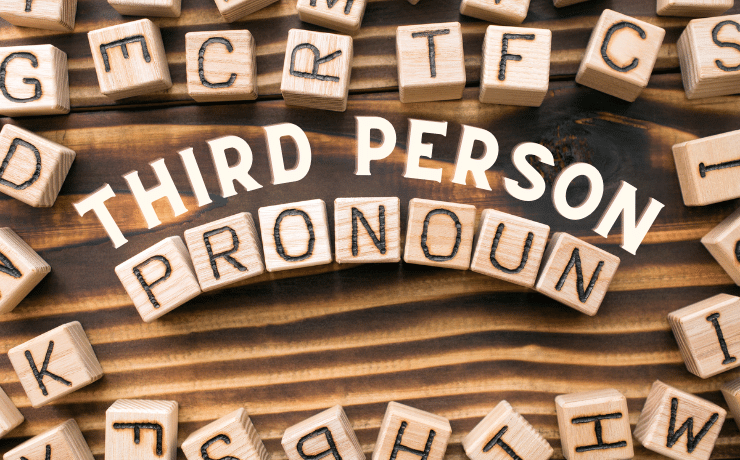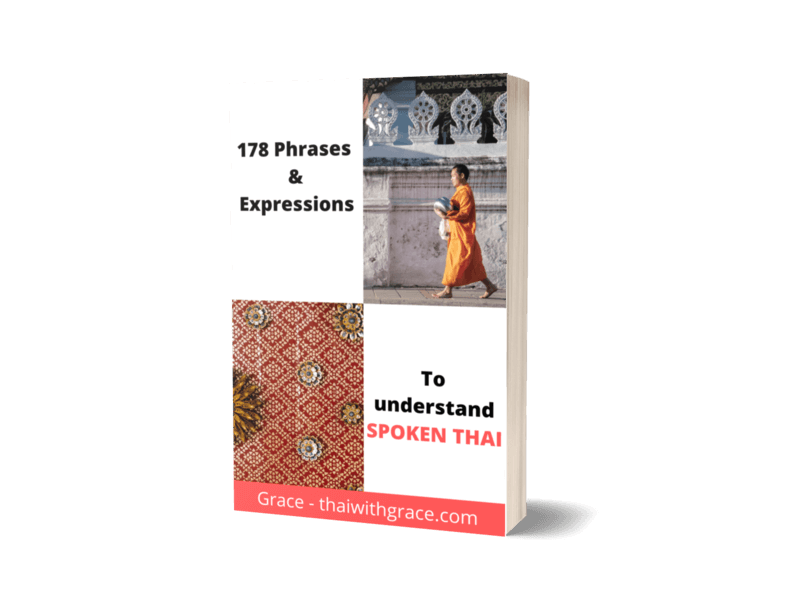Third person pronouns in Thai are not hard but can be a little bit confusing. In this article, we will clear that doubt, and I will also explain the common mistake that foreigners like to make when learning Thai.
Check out the video version of this article above and download the transcript of the video here.
เขา for “he” and “she”
เขา \kăo\ (rising tone) is the most common way to say “he”, or “she”. However, beware, the correct colloquial way to pronounce it is เค้า \káo\ (high tone). When you read a text, it’s correct to pronounce เขา but not when you speak.
- Look at his necktie
ดูเน็คไทเขาสิ
doo nék-tai kăo sì - What is she doing here?
เขามาทำอะไรที่นี่
kăo maa tam à-rai têe nêe - I don’t know what time she’s coming.
ไม่รู้เขาจะมากี่โมง
mâi róo kăo jà maa-gèe mohng - Why do you love him?
ทำไมถึงรักเขา
tam-mai tĕung rák kăo

Is เธอ she in Thai?
เธอ (ter) is often misunderstood as the most common way to say “She”. In fact, I have not seen a Thai person used เธอ for “she” in spoken language. Usually, the word เธอ is used in novels when the author talks in the third person point of view.
Example from Harry potter:
- Then Hermionie enters the room. While she’s looking for a seat. She saw Ron. Then say said to Ron “…”
แล้วเฮอไมโอนี่ก็เข้ามาในห้อง ในขณะที่เธอกำลังหาที่นั่น เธอเหลือบไปเห็นรอนแล้วเธอพูดกับรอนว่า”…”
láew hermoine gôr kâo maa nai hông · nai kà-nà têe ter gam-lang hăa têe nân · ter lèuuap bpai hĕn Ron láew ter pôot gàp Ron wâa
แก as “he”, “she”
แก (gae) is often used as “he” or “she” when talking about older and respectable people such as parents, teachers, etc.
Examples:
- Don’t make your dad sad. He’s old already.
อย่าทำให้พ่อเสียใจเลย แกก็แกแล้ว
yàa tam hâi pôr sĭia jai loiie · gae gôr gae láew - He/She didn’t mean it that way.
แกไม่ได้หมายความแบบนั้นหรอก
gae mâi dâai măai kwaam bàep nán ròk
ท่าน as “he”, “she”
ท่าน (tân) is similar to แก but has even more “respectable” nuance. It can be used in the same way you use แก (gae)
- Don’t talk back to your boss. If he gets angry, you will be in trouble.
อย่าเถียงเจ้านายนะ ถ้าท่านโกรธขึ้นมาจะเป็นเรื่องใหญ่
yàa tĭiang jâo naai ná · tâa tân gròht kêun maa jà bpen rêuuang yài
มัน as “he”, “she” and “it”
มัน means “it”. So you can use มัน to talk about objects or animals.
Examples:
- It’s a dog.
มันคือหมา
man keu măa - If you don’t want to do it, then don’t do it.
ถ้าไม่อยากทำก็ไม่ต้องทำมัน
tâa mâi yàak tam gôr mâi dtông tam man
However, มัน can also be used as “she” or “he” in Thai but in a very rude way. It’s demeaning that person to an object or animal.
- Who is he/she?
มันเป็นใคร
man bpen krai - Don’t talk to him/her.
อย่าพูดกับมัน
yàa pôot gàp man
Family terms as “he”, “she” in Thai
Family terms can be used as “he” or “she” even if you are not actually related. Family terms such as: dad พ่อ (pôr), mom แม่ (mâe), uncle ลุง (lung), Aunt ป้า (bpâa), Aunt น้า (náa), Aunt อา (aa), Older sibling พี่ (pêe), Younger sibling น้อง (nóng), Grandpa ปู่ (bpòo), Grandma ย่า (yâa), Grandma ตา (dtaa), Grandma ยาย (yaai).
Check out my article about Family terms in Thai to learn about all the family terms here:
Plural third person pronouns in Thai
In Thai, plurality is not very important. Many times you can just say เขา (kăo) to say “they” in Thai, but if you want to be very clear that you are talking about more than 1 person, you can add พวก.
So, you can say พวกเขา (pûuak kăo), พวกแก (pûuak gae), พวกมัน (pûuak man) to put an emphasis on plurality.
Examples:
- What are they doing?
พวกเขากำลังทำอะไรอยู่
pûuak kăo gam-lang tam à-rai yòo
I hope now you know how to say “he”, “she”, “it” in Thai.
To learn more about pronouns in Thai. Read my article on first person pronouns in Thai.
And also read my article on Second person pronouns in Thai.
I will see you in the next article.

